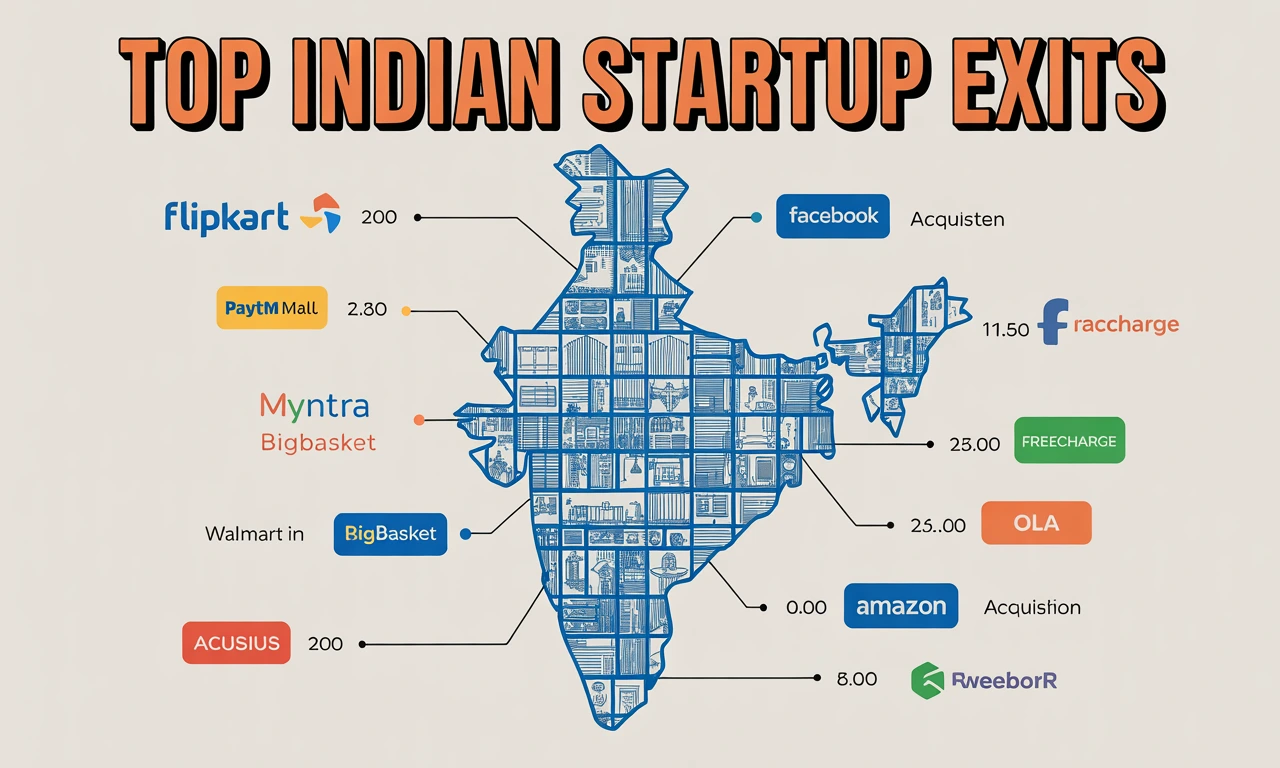RedBus, started in 2006 by Phanindra Sama, Charan Padmaraju, and Sudhakar Pasupunuri, changed how Indians reserve bus tickets. Before RedBus, reserving bus tickets involved going to bus stops or travel agents.When I talk to my friends about business, many don't know what an "exit" really means. Simply put, an exit happens when startup founders sell their company to bigger firms or go public through an IPO. It's like graduating from startup school with flying colors! India's startup world has been buzzing with such success stories. Let's look at some companies that hit the jackpot and made their founders, investors, and employees very happy.
Top Indian Startup Exits That Made Headlines
Flipkart: India's Biggest Startup Success Story
The day in 2018 when the news broke—Walmart had bought Flipkart for an amazing $16 billion! This was not just any sale; it was the largest purchase in India's startup history. From a tiny flat with only 4 lakh, Sachin and Binny Bansal founded Flipkart in 2007. They began by selling books online when e-commerce was still new in India. Through hard work and smart choices, they built a company that became India's answer to Amazon. The Walmart deal made many Flipkart employees millionaires overnight as their stock options suddenly became worth a fortune. This exit showed everyone that Indian startups could reach global standards and attract international buyers.
Read also: Latest Indian Startup Funding News 2025
Citius Tech: Healthcare Tech Success
Healthcare technology might not sound as exciting as online shopping, but Citius Tech proved it could be just as rewarding. In 2019, Baring Private Equity Asia bought a major stake in Citius Tech for about $1 billion. Started by Rizwan Koita and Jagdish Moorjani in 1999, Citius Tech provides healthcare technology solutions. Their exit shows that specialized knowledge in important fields can lead to huge rewards. What I find most inspiring about Citius Tech is how they focused on solving real problems in healthcare rather than chasing trendy ideas. This focus on substance over style brought them lasting success.
List Of Indian Startups With Successful Exits Through Acquisitions
Freecharge: The Quick Deal
One of the quickest deals in Indian startup history, Snapdeal acquired Freecharge for $400 million in 2015. It all took only 22 days. Kunal Shah founded Freecharge in 2010 as a platform for mobile recharges with cashback offers. The company became popular very quickly because they made mobile recharges fun with their discount coupons. Later, in 2017, Axis Bank bought Freecharge from Snapdeal for $60 million. Though this was less than the original acquisition price, it still showed how digital payment companies were highly valued.
RedBus: Ticket to Success
Though I booked bus tickets using RedBus many times, I never realised its incredible past until I looked for this piece. Founded in 2006 by Phanindra Sama, Charan Padmaraju, and Sudhakar Pasupunuri, RedBus transformed how Indians book bus tickets. Before RedBus, booking bus tickets meant visiting travel agents or bus stations. RedBus made it clear and easy by bringing this procedure online. RedBus was bought by the Ibibo Group (part of Naspers) for around $101 million in 2013. Starting with only 5 lakh, the founders produced great wealth in only seven years. That's what I call a seamless path to success!
TaxiForSure: The Ride-Hailing Exit
In a cash and equity deal in 2015, Ola Cabs bought TaxiForSure for $200 million. Raghunandan G and Aprameya Radhakrishna founded TaxiForSure, one of India's first cab aggregator companies, in 2011. Although Ola and Uber offered fierce competition, the company managed to acquire substantial market share before the merger. However, both founders left this exit to start fresh successful businesses, indicating that entrepreneurship really runs in their blood!
List Of Indian Startups With Successful Exits Through IPOs
Zomato: From Food Delivery to Stock Market Star
Zomato's journey to the stock market was one I followed closely. Deepinder Goyal and Pankaj Chaddah founded the company in 2008 under "Foodiebay"; it finally changed its name to Zomato. With an IPO oversubscribed 38 times, Zomato went public in July 2021. Valued at over $12 billion, the firm generated about 9,375 crore ($1.3 billion). Early investors watched their capital grow many times. Zomato's evolution from a basic restaurant search tool to a full-fledged meal delivery behemoth is what divides it. Though they came out stronger, their path was not always easy; they battled fierce competition, had to close down operations in certain nations, and survived the COVID-19 storm.
Nykaa: Beauty That Paid Off
Nykaa's success narrative is particularly motivating as Falguni Nayar started it when she was 50 years old. This shows that beginning up is never too late. When most Indians were still purchasing cosmetics from local retailers, Nykaa started in 2012 as an online beauty merchant. Nykaa became the first place for beauty items by knowing what Indian customers desired and creating a reliable brand. Nykaa went public in November 2021 with an IPO valuing the business at $13 billion. On the first trading day, the stock doubled! Returns of up to 100 times their initial investment were seen by early investors. Finding the correct market at the right moment has great power.
PolicyBazaar: Insuring Future Success
Many may find insurance dull, but Policy Bazaar makes it interesting for investors. Yashish Dahiya and Alok Bansal created the firm in 2008; it has since made insurance comparison and getting easier for millions of Indians. With an IPO that was oversubscribed 16 times, PB Fintech, Policy Bazaar's parent company, went public in November 2021. With a value of almost $6 billion, the firm generated roughly $5,625 crore (about $750 million). Policy Bazaar's ability to find a difficult issue—grasping insurance policies—and simplify it for regular people is what I like most. Their TV commercials with the "Policy Bazaar dot com" jingle added to their household brand status!
What Makes These Indian Startup Exits Special?
The Journey From Small Beginnings to Big Exits
Most of these success stories have something in common – humble beginnings. Flipkart started with selling books from an apartment. Red Bus began with three friends frustrated by the bus ticket booking process. Nykaa was started by a woman leaving her banking career to venture into the unknown world of e-commerce. These founders didn't have special advantages or massive funding from day one. They identified real problems, worked hard to solve them, and persisted through challenges. This shows that with the right idea and determination, anyone can build a valuable company.
Read also: Trump Funding Freeze: What You Need To Know?
Exit Strategy in Indian Startups: Lessons for Entrepreneurs
From studying these successful exits, I've noticed some patterns that might help future entrepreneurs:
- Solve real problems: Companies that addressed genuine pain points (like RedBus with bus ticketing or PolicyBazaar with insurance comparison) created lasting value.
- Build for scale: All these companies built systems that could handle millions of users. Technology was a key enabler of their growth.
- Focus on unit economics: The most successful exits came from companies that figured out how to make money on each transaction, not just those who grew users at any cost.
- Timing matters: Many of these startups rode the wave of internet adoption and smartphone growth in India. They entered the market at the right time.
- Strong founding teams: Almost all had complementary co-founders who brought different skills to the table.
Recent Trends in Indian Startup Acquisitions
The Growing Interest of Global Companies
Global giants seem more and more to be considering Indian startups for purchases, I have seen. Walmart, Meta (Facebook), Google, Microsoft, and other firms have all invested heavily in Indian businesses or bought them. This trend indicates that Indian businesspeople are creating firms with worldwide standards and appeal. It also increases more exit possibilities for investors and founders.
Sector-Wise Analysis of Successful Exits
From my analysis, certain sectors have seen more successful exits than others:
- E-commerce and retail: Flipkart, Myntra, Jabong
- Fintech: Freecharge, Citrus Pay, BillDesk
- Food tech: Zomato, TastyKhana
- Transportation: TaxiForSure, RedBus
- Healthcare: Citius Tech, Pharmeasy
This doesn't mean other sectors don't offer exit opportunities, but these areas have shown particular promise for building valuable companies in India.
The Impact of Successful Exits on India's Startup Ecosystem
Creating a Virtuous Cycle
Every successful exit influences the startup ecosystem in a rippling manner. Here's how:
- Wealth creation for employees: When startups exit, employees with stock options often become wealthy overnight. Many use this money to start their own companies or become angel investors.
- Experienced talent pool: People who've worked at successful startups gain valuable experience that they bring to new ventures.
- Investor confidence: Successful exits boost investors' willingness to support other Indian companies by providing them confidence, hence producing additional money.
- Role models: Success tales motivate aspiring business owners to jump off faith and launch.
via my own experience, colleagues who worked for businesses like Flipkart have gone on to launch their own firms using the expertise and funds they acquired via their stock options. This builds a good cycle that enhances the whole ecology.
What These Exits Mean for India's Economic Growth
Startup exits don't just benefit founders and investors; they contribute significantly to India's economic growth:
- Job creation: Successful startups create thousands of direct and indirect jobs.
- Tax revenue: Large exits generate substantial tax revenue for the government.
- Foreign investment: Success stories attract more foreign investment into Indian startups.
- Innovation culture: A thriving startup ecosystem fosters innovation across sectors.
How to Build a Startup That Could Achieve a Successful Exit
Key Strategies I've Observed
Based on the patterns from successful exits, here are some tips for aspiring entrepreneurs:
- Create something genuinely necessary: Work on addressing actual issues instead of chasing fads.
- Most successful businesses started with a modest level and grew over time; thus, dream big but start small.
- Choose the founding team correctly. Success is sometimes tied to having co-founders with complementary abilities.
- Work on sustainable development: Create a company strategy that can one day be successful.
- Monitor strategic value: Know what might one day make your business appealing to possible buyers.
Common Mistakes to Avoid
Just as important as what to do is what NOT to do. Here are some mistakes that can reduce chances of a successful exit:
- Ignoring unit economics: Growing at all costs without a path to profitability rarely leads to good exits.
- Taking too much or too little funding: Finding the right balance is important.
- Not building a strong team: Acquirers often buy startups for their talent as much as their products.
- Failing to adapt: Market conditions change, and successful startups evolve accordingly.
Read also: Business Funding With Essential Tips Wikiteak: A Complete Guide
Future Outlook: The Next Wave of Potential Exits
Emerging Sectors to Watch
Based on current trends, I believe these sectors might produce the next big exits:
- Edtech: Companies like BYJU'S, Unacademy, and Vedantu have raised significant funding and could see major exits.
- Healthtech: The healthcare sector was transformed by the pandemic, creating opportunities for tech-enabled solutions.
- B2B SaaS: Indian SaaS companies serving global markets, like Freshworks (which already had a successful IPO), represent a growing trend.
- Climate tech: Startups working on sustainable solutions for energy, water, and waste management are attracting interest.
- Direct-to-consumer brands: Several D2C brands have shown rapid growth and cold be acquisition targets for larger consumer goods companies.
The Evolution of Exit Strategies in Indian Startups
The exit landscape is evolving in India. Earlier, most exits were through acquisitions by larger companies. As the Indian public markets develop and embrace technology firms, we are now witnessing more IPOs. Popular worldwide SPAC (Special Purpose Acquisition Company) deals might possibly one day offer exit chances for Indian companies.
Conclusion
Every year, the list of Indian firms with successful exits grows, reflecting the development of India's startup environment. From Flipkart's enormous $16 billion sale to smaller but equally remarkable exits like RedBus, these success examples show that Indian entrepreneurs can create world-class businesses. What most thrills me is that India's startup path is still in its early stages. The success tales we have witnessed thus far are probably only the start. Given India's expanding digital economy, rising startup financing, and developing ecosystem, I anticipate many more remarkable exits in the next years. These success stories provide insightful insights and motivation whether you are an investor, entrepreneur, or simply someone curious about startups. They demonstrate that Indian businesses can produce amazing results with the correct concept, team, execution, and timing.













